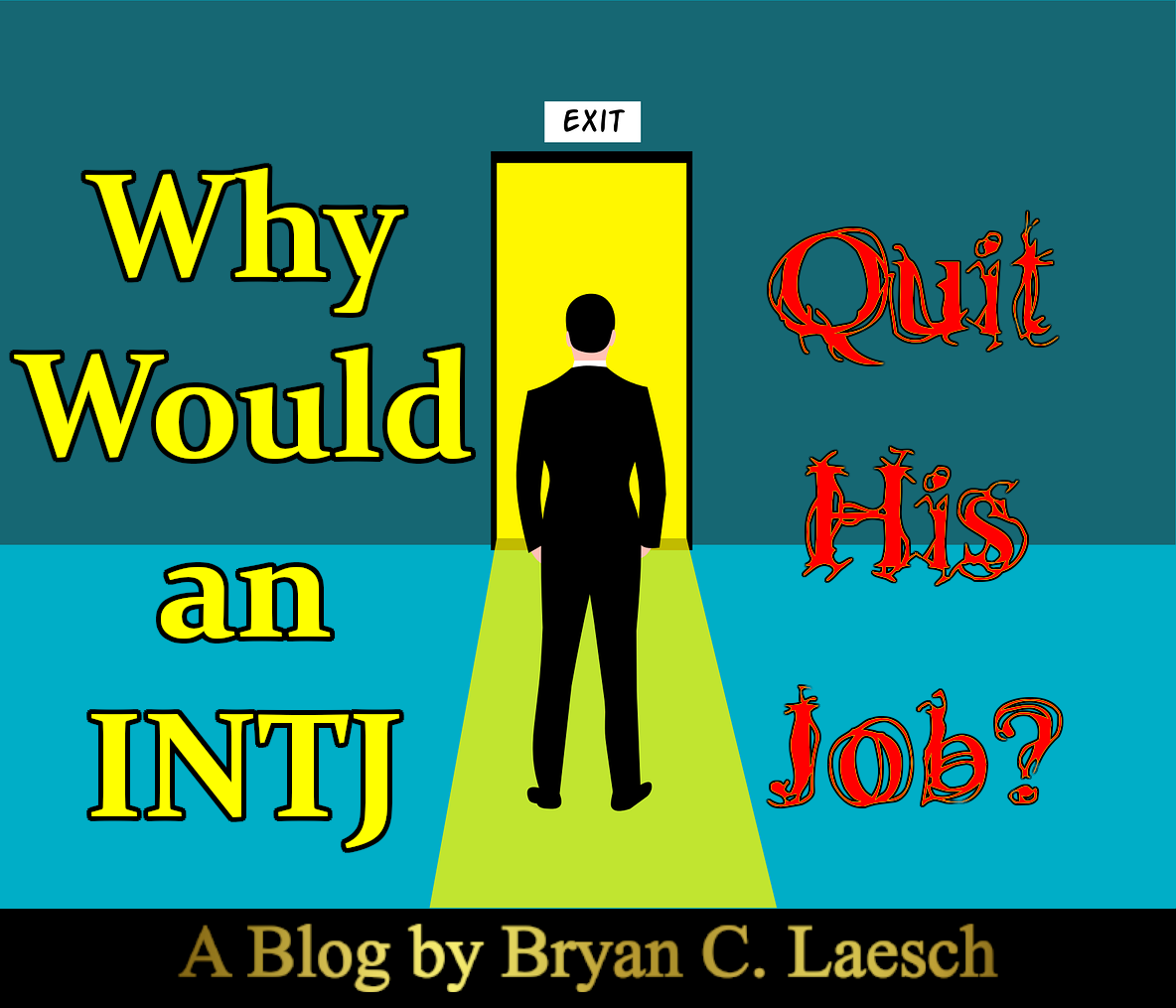Good news, everyone!
So, back in September, I had a few new interesting experiences. One of them was going to a concert for the first time (blog coming soon) and the other was quitting my job. Now, quitting one’s job seems very out of character for an INTJ, but it does happen. And to be clear, I am making a distinction between quitting and resigning. When you resign, you give an employer forewarning that you’re leaving, but when you quit, there is no warning. This is very out of character for INTJs as they are the sort of people to look miles down the road or months into the future. This sort of foresight is one of the reasons why INTJs are so dependable—because as they can “predict” the future, they can also predict how it will relate to them. And seeing as how they don’t like random or unknown variables (surprises), they try to remove as many of them as possible from their own life and everyone else’s, as a courtesy. Therefore, the question needs to be asked: why would an INTJ quit his job? Why would an INTJ allow an unknown or random variable act in his life and the lives of those around him?
Don’t Tell Me Robots Can’t Cry

So, why would an INTJ not only allow a random variable to affect everyone’s life, but also be the one to introduce it? If we look at an INTJ’s cognitive functions, we may get an idea.
For instance, an INTJ might introduce a random variable in order to pursue the truth (Ni) or because it’s the most logical thing to do (Te). It’s also possible that an INTJ might do it because it would be a pleasurable experience (Se). But in the case of professions, jobs, and careers, that is to say, the world of dependable work for dependable results, a random, unknown variable often doesn’t unveil any truth, isn’t logical, and is certainly not pleasurable. Therefore, we must look at an INTJ’s tertiary function, Fi, to find the answer. But what is Fi?
Fi stands for introverted feeling and it is often a function that guides morality. It is responsible for an INTJ’s strict code of ethics and why INTJs tend to cheer for the underdog. However, it is important to note that since Fi is introverted, it is directed inward, meaning that while it guides morality, it most often guides personal morality (ethics). It doesn’t really care about how the group is feeling and instead asks the question “How I am feeling?” or “How am I doing?” This is one of the reasons why INTJs are such stout individuals. Their personal feelings come first (so long as their feelings don’t interfere with the truth [Ni] or logic [Te]). So, with that answered, what does Fi have to do with quitting one’s job?
Just Desserts
Well, as you may remember, I said that INTJs try to remove as many unknown and random variables as possible from their lives (to make things easier) and from other people’s, but often this is done out of courtesy. So, it can be hypothesized that if an INTJ purposely introduces an unknown, random variable in a realm where dependability and consistency are highly prized, that is to say, they acted discourteous on purpose, it’s because an INTJ’s Fi was violated. That is to say, someone pissed off, hurt, or was otherwise discourteous to the INTJ, and so, they returned the favor.
To illustrate my point, let’s look at why I quit my job. So, at the end of a Friday, the boss called us into a “meeting” where he detailed that we would be receiving some new equipment the following week and how it would affect our schedules. At that point, he turned to our newest hire and mentioned he had made a grave mistake at one of our presses, and that if we needed to send it out for repairs, it could cost us $40K. After that, he turned to me and accused me of being lazy because he always saw me sitting down. Additionally, he said the sight of me sitting down irritated him so much that he wanted to put his foot in my anus (not his exact words, but I’m sure you can guess what they were). On top of that, he admitted that this wasn’t the right forum for his critique, but because of our interviews, we knew he preferred to be blunt and “call things as he sees them”.
I didn’t say anything in response because it was true that I did sit down a lot, but it was not due to laziness but rather a lack of direction. I know this for a fact because at my new job I’m on my feet 8 hours a day and I’ve worked overtime three times: once on a Saturday, once on a Sunday, and once in a 12-hour shift. Those are not the actions of the lazy. (Blog coming soon as to what gets INTJs to work OT.) So, my former boss’ comments have earned a greater distaste in my mouth since.

What further irked me was that I was being accused of doing “my” job poorly. Now, I was hired in as Quality Assurance, but because we were remodeling the shop at the time, I didn’t have access to the Internet, and therefore, I couldn’t do my usual work. And because we were short of help, I had to assist with working some of the presses, making sure that parts were collected, inspected, boxed, and so forth. And in doing this, sometimes parts ended up on the floor. I didn’t think anything of it because the general manager didn’t pick them up, he never told me to pick them up, and no one had told me that was a part of the job. Plus, I figured that as a plastic mold injection shop, there were bound to be parts all over the place anyway. I mean, we had unusable parts littering our desks. So, you can probably imagine that I didn’t like being called out for a job that I was neither originally hired for nor was I properly trained for. In fact, I had been set up to fail from the start. I didn’t say anything about this though because I figured my boss and coworkers would see it as an excuse. Now, though, after working for my current employer for nearly two months where every time I go to a new station, the job is explained to me in as much detail as possible, I now know that that isn’t an excuse. And never mind the fact that my boss put me on blast in front of everyone and didn’t have to as he could have merely spoken to me about his concerns and issues. I mean, I am capable of taking constructive criticism. There’s no need to get pissy and wait for an opportunity when I’m an easy target in front of everyone.
So, at first, I was willing to accept his criticism, but the more people I told the situation to, the more others were outraged for me. That was when I realized I had a right to be outraged. Plus, I had the weekend to think it over. And the more I thought, the more I began to think I didn’t owe my boss or the company anything. What made things worse were the benefits were lousy, the working conditions were terribly uncomfortable, and I had seen my boss take his temper out on my fellow employees. So, given that the job wasn’t great in all sorts of ways, and that it was likely I was going to have more problems down the road, I said, “Screw it. I’m quitting.” And so, on Monday morning, I had a notice of resignation, effective immediately (basically quitting), and turned a copy into the general manager, my boss, and the owner. There have to be consequences to treating your employees that way. Talking it out is not enough, but by quitting, I may have just sent a strong enough message.
But getting this back to MBTI… Since my Fi, that is to say, my personal ethics—the way I treat myself and the way I expect to be treated by others because I (try to) offer them the same respect—was offended, I said, “Screw it; suck on an unpredictable, random variable, you douche.” (Also, I had a new job with better pay, hours, benefits, work, management, and coworkers waiting for me two weeks later. I dare say I made the right choice.)

Conclusion
Now, it is true that there may be many reasons why an INTJ may quit his job, but like I said, Ni pursues the truth, Te looks for the rational, and Se just wants to have a good time, so it is therefore most likely that an INTJ will quit a job if his Fi is irked. Now, that I think about it, it may be due to an INTJ’s Fi that we strive so hard to act like gentlemen. (Maybe that’s a future topic.) But the point is, if you piss off an INTJ’s Fi, you can expect that INTJ to piss on you in return.
Thank you for your patronage.
Follow me on Social Media:
FB: https://www.facebook.com/bryanclaesch
IG: https://www.instagram.com/bryanclaesch/
Twitter: https://twitter.com/BryanofAllTrade
Pinterest: https://www.pinterest.com/bryanclaesch/

Interesting… (*yoda voice*) the Fi is strong with this type!
An INTJ friend of mine quit his job for similar reasons, even though his boss’ attitude was nearly opposite of your former boss’. Essentially, he had been recognized for excellent work, but was being subjected to a generalized punishment anyway because his coworkers weren’t doing what they were supposed to do. His boss was willing to take on the inconvenience of the punishment for him, but he quit the job anyway because it was the principle of the thing.
Moral of the stories:
Treat INTJ employees fairly #MeritocracyOrDie
Yes, that makes sense to me.